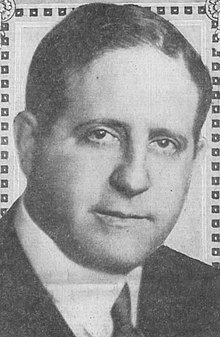Albert Ottinger
| Albert Ottinger | |
|---|---|

From the September 29, 1928 edition of the Binghamton Press.
|
|
| Republican Nominee for Governor of New York | |
|
In office 1928 |
|
| Preceded by | Ogden L. Mills |
| Succeeded by | Charles H. Tuttle |
| New York Attorney General | |
|
In office 1925–1928 |
|
| Preceded by | Carl Sherman |
| Succeeded by | Hamilton Ward, Jr. |
| United States Assistant Attorney General | |
|
In office 1921–1924 |
|
| Preceded by | Thomas J. Spellacy |
| Succeeded by | Ira Lloyd Letts |
| Member of the New York State Senate, 18th District | |
|
In office 1917–1918 |
|
| Preceded by | William M. Bennett |
| Succeeded by | Salvatore A. Cotillo |
| Personal details | |
| Born |
September 10, 1878 New York City, New York |
| Died | January 13, 1938 (aged 59) New York City, New York |
| Resting place | Union Field Cemetery, Ridgewood, Queens, New York |
| Political party | Republican |
| Relations | Richard L. Ottinger (nephew) |
| Alma mater | New York University Law School |
| Profession | Attorney |
Albert E. Ottinger (September 10, 1878 – January 13, 1938) was an American lawyer and politician.
He was born in New York City, the son of Moses Ottinger and Amelia Gottlieb Ottinger. He graduated from New York University Law School in 1898 and became an attorney in New York City.
He was a member of the New York State Senate (18th D.) in 1917 and 1918; and then an assistant Attorney General of the United States. As such, Ottinger ruled that the U.S. Congress could grant independence to the Philippines if it wished, since the Philippines were an "insular possession" and therefore to be distinguished from the United States' states and territorial possessions.
He was New York State Attorney General from 1925 to 1928, elected in 1924 and 1926. During his second term, he was the only Republican who held state office, and was responsible for closing down the notorious on Wall Street. He was a delegate to the 1928 and 1932 Republican National Conventions.
In 1928, while the Democratic Party nominated New York Governor Al Smith for the Presidency, the first time a Catholic from a major party was running for that office, the Republican Party of New York nominated Ottinger for Governor, the first Jewish gubernatorial candidate in New York history. The Democratic Party nominated Franklin D. Roosevelt for governor, and Herbert Lehman, also a Jew, as the candidate for Lieutenant Governor of New York. On the national ticket, Herbert Hoover won by a landslide over Al Smith, the latter's religion clearly a national issue. The gubernatorial contest, however, was one of the closest in New York history. Against the national Republican trend, Roosevelt won by only 25,000 votes, less than 1% of the four million ballots cast.
...
Wikipedia
